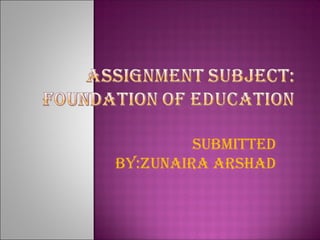
skineer theory
- 3. Skinner essentailly a behaviourist ,that,s why he present behaviourst approach theory in 1913.
- 4. Learning: A relatively permanent change in behavior or knowledge due to experience.
- 5. It’s the observation of behaviour,it is only a way to study the behaviour of a person……………….
- 6. Classical conditioning Operant conditioning
- 7. Is the type of behaviourist learning in which association are established between automatic emotional or psychological response and stimuli.
- 8. Is a method of learning that occures through rewards and punishments for behaviours through operant conditioning an association is made b/w behaviour and and a consequence for that behaviour.
- 9. The major theorists for the development of operant conditioning are: Edward Thorndike John Watson B.F. Skinner
- 10. Neutral operants: responses from the environment that neither increase nor decrease the probability of a behavior being repeated. Reinforcers: Responses from the environment that increase the probability of a behavior being repeated. Reinforcers can be either positive or negative.
- 11. Punishers: Response from the environment that decrease the likelihood of a behavior being repeated. Punishment weakens behavior
- 12. Positive reinforcement negative reinforcement
- 13. Positive reinforcement Negative reinforcement A reward is Something given for the undesireable as desireable taken away as a change concequences of desireable behaviour
- 14. Clearly specify the action or performance the student is to learn to do. Break down the task into small achievable steps, going from simple to complex. Let the student perform each step, reinforcing correct actions. Adjust so that the student is always successful until finally the goal is reached. Transfer to intermittent reinforcement to maintain the student's performance
- 15. Markle, S. (1969). Good Frames and Bad (2nd ed.). New York: Wiley. Skinner, B.F. (1950). Are theories of learning necessary? Psychological Review, 57(4), 193- 216. Skinner, B.F. (1953). Science and Human Behavior. New York: Macmillan.
- 16. Fodor, JA; Bever, TG; & Garrett, MF. (1975) The Psychology of Language: An Introduction to Psycholinguistics and Generative Grammar. New York: McGraw-Hill. Lana, Robert E. The cognitive approach to language and thought. Journal of Mind & Behavior. Vol 23(1-2) Win-Spr 2002, 51-67. Inst of Mind & Behavior, US
